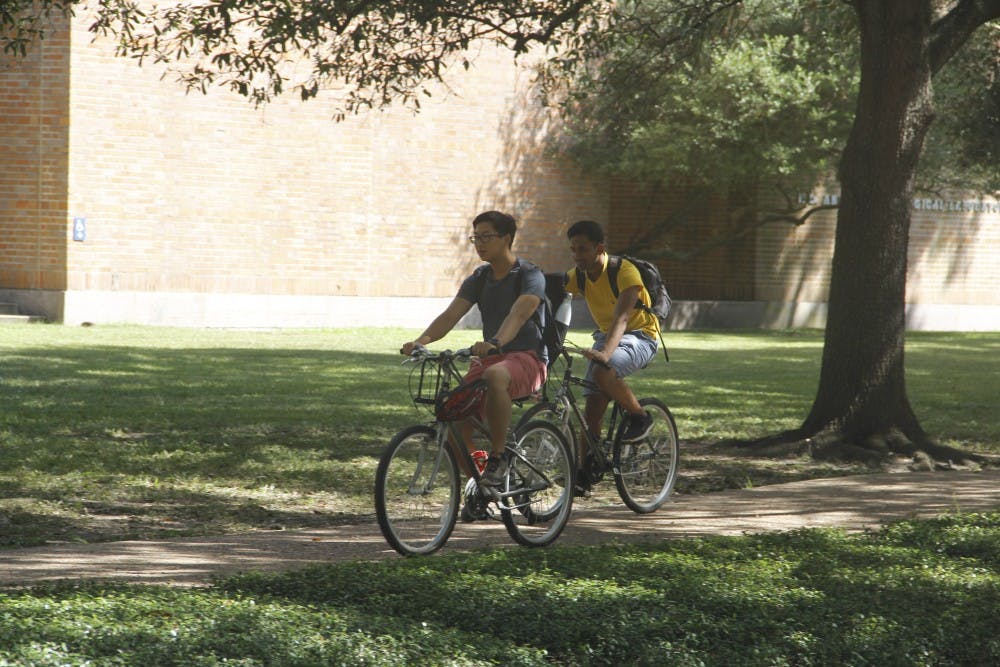Rice applies for bike-friendly status

Rice University may be designated a 'Bicycle Friendly University' by The American Bicyclists after nearly doubling its number of bike racks since 2014.
Rice University’s Transportation Demand Management department submitted an application on Aug. 6 for Rice’s designation as a “Bicycle Friendly University,” following a years-long effort to improve biking at Rice.
The League of American Bicyclists will announce new designations this fall. The organization created the Bike Friendly University program as a way to support schools that wish to become better cycling environments.
Rice could be the first university in Houston to become a Bike Friendly University, joining fellow Texas universities such as Texas A&M University, the University of Texas at Austin, and Texas Tech University.
The League of American Bicyclists classifies Bike Friendly Universities based on four levels: bronze, silver, gold and platinum. The criteria for each level is based on engineering, education, encouragement, enforcement and evaluation of universities’ bicycling culture, according to the League’s website.
Madeleine Pelzel, the 2016 Rice Bikes general manager, said becoming a Bike-Friendly University would be an important step forward for transportation accessibility and sustainability.
“Rice is making a statement about the type of university that it aspires to be both now and in the future,” Pelzel, a Lovett College senior, said. “I’m excited about the potential this holds.”
According to Lisa Lin, Rice’s transportation demand manager, the application required a number of campus statistics that elicited research on Rice’s bicycling culture. One find from the department’s research showed Rice’s campus holds over 3,000 bike racks, or almost a bike rack per undergraduate, while Texas State University has about 2,000 bike racks, or 1 per 18 undergraduates.
Zach Verne, a student intern for the transportation demand management program, said that Rice has nearly doubled the number of campus bike racks since 2014.
“I think the huge increase in the number of bike racks on campus over the past three years is indicative of a trend in the Rice population towards more sustainable forms of transportation,” Verne, a McMurtry College sophomore, said.
However, according to Verne, Rice still needs to improve its road and pathway infrastructure to improve campus biking.
“Bicyclists are often forced to take shared-use paths when riding on the opposite direction of the one-way inner loop [and] often times there is not enough room for both groups to use them effectively,” Verne said.
Verne said Rice’s biking culture is making forward progress, citing organizations such as Rice Bikes. Lydia Dick, Rice Bikes’ general manager, said the student-run business is at its core concerned with making biking as accessible as possible.
“Our shop’s mission has always been to encourage more students to take up cycling as well as to make bike services easier, cheaper and more accessible to students,” Dick, a Martel College senior, said. “We hope that this new initiative will encourage more students, faculty and staff to take up biking as a healthier, greener alternative to driving.”
According to Verne, because Rice has bike racks at every major building on campus, more community members could be encouraged to take up biking.
“This is an especially good trend because it could potentially snowball with more bikers leading to better biking infrastructure which leads to more people biking,” Verne said. “If this trend continues, in a few years Rice could become as bicycle friendly as Bike Friendly University superstars like Stanford, Colorado State and [the University of California at] Davis,” Verne said.
One of the biggest disadvantages Rice must overcome to improve biking culture on campus is the state of bicycling in the City of Houston, Verne said. In March, Houston Mayor Sylvester Turner and HPD Chief Art Acevedo introduced a campaign to improve cyclists’ safety in the city.
“Houston is at times a difficult city to bike in and its bicycling infrastructure has not caught up to the likes of Portland, Seattle or New York,” Verne said. “Dispelling the myth that it is difficult to bike in Houston is a hard task, but an important one that is taken on by local bicycling groups such as Bike Houston.”
According to Lin, the transportation management department hopes for at least a bronze level distinction, but a higher designation would be exciting.
“I believe we can get to gold, maybe even platinum, but it’ll take time to put certain practices into place on campus while working with the City of Houston to ensure that our streets are bike-friendly also. The city’s goal is to achieve a gold level bike-friendly city by 2027. If they’re able to achieve that, it’ll make it easier for us to get to gold.”
According to Lin, the most valuable aspect of the application process was to compile the work Rice has done for its bicycling culture into one document. She said the document serves as a starting point for continuous improvement for the future.
“[This] designation [would be] the icing on the cake,” she said.
Note: A previous version of this article was mistakenly titled "Rice applies to be first Texas Bike Friendly University." Rice would only be Houston's first bike friendly university.
More from The Rice Thresher

Andrew Thomas Huang puts visuals and identity to song
Houston is welcoming the Grammy-nominated figure behind the music videos of Björk and FKA twigs on June 27.

Live it up this summer with these Houston shows
Staying in Houston this summer and wondering how to make the most of your time? Fortunately, you're in luck, there's no shortage of amazing shows and performances happening around the city. From live music to ballet and everything in between, here are some events coming up this month and next!

Rice to support Harvard in lawsuit against research funding freeze
Rice, alongside 17 other research universities, filed an amicus curiae brief in support of Harvard University’s lawsuit against the Trump administration over more than $2 billion in frozen research grants.

Please note All comments are eligible for publication by The Rice Thresher.